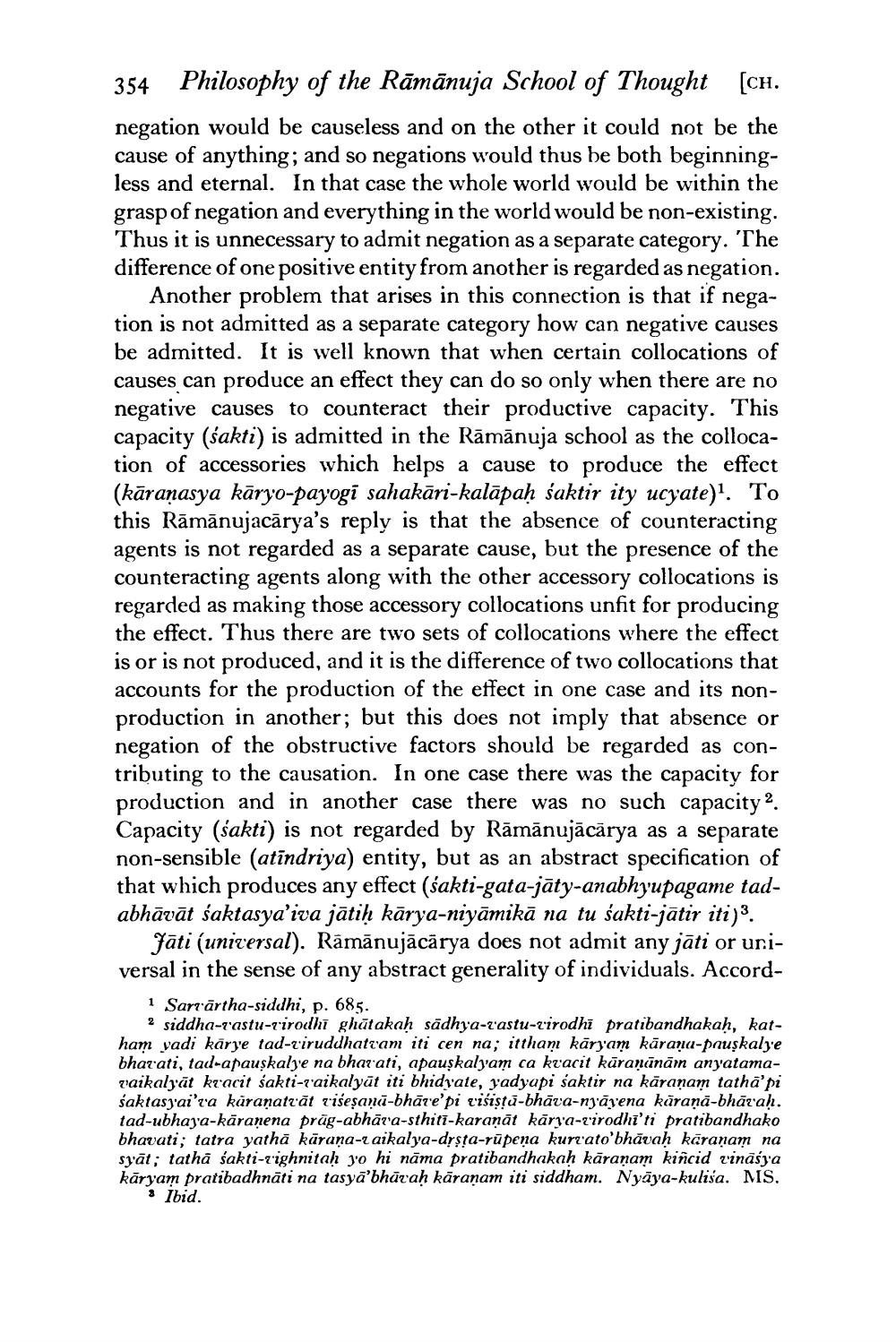________________
354 Philosophy of the Rāmānuja School of Thought (ch. negation would be causeless and on the other it could not be the cause of anything; and so negations would thus be both beginningless and eternal. In that case the whole world would be within the grasp of negation and everything in the world would be non-existing Thus it is unnecessary to admit negation as a separate category. 'The difference of one positive entity from another is regarded as negation.
Another problem that arises in this connection is that if negation is not admitted as a separate category how can negative causes be admitted. It is well known that when certain collocations of causes can produce an effect they can do so only when there are no negative causes to counteract their productive capacity. This capacity (sakti) is admitted in the Rāmānuja school as the collocation of accessories which helps a cause to produce the effect (kāraṇasya kāryo-payogi sahakāri-kalāpaḥ śaktir ity ucyate)". To this Rāmānujacārya's reply is that the absence of counteracting agents is not regarded as a separate cause, but the presence of the counteracting agents along with the other accessory collocations is regarded as making those accessory collocations unfit for producing the effect. Thus there are two sets of collocations where the effect is or is not produced, and it is the difference of two collocations that accounts for the production of the effect in one case and its nonproduction in another; but this does not imply that absence or negation of the obstructive factors should be regarded as contributing to the causation. In one case there was the capacity for production and in another case there was no such capacity 2. Capacity (sakti is not regarded by Rāmānujācārya as a separate non-sensible (atīndriya) entity, but as an abstract specification of that which produces any effect (sakti-gata-jāty-anabhyupagame tadabhāvāt saktasya'iva jātiḥ kārya-niyāmikā na tu sakti-jātir iti).
Jāti (universal). Rāmānujācārya does not admit any jāti or uriversal in the sense of any abstract generality of individuals. Accord
i Sartārtha-siddhi, p. 685.
2 siddha-t'astu-rirodhi ghātakaḥ sādhya-t'astu-tirodhi pratibandhakah, katham vadi karye tad-viruddhattam iti cen na; ittham karyam kāraņa-pauşkalye bharati, tad-apauşkalye na bharati, apauskalyam ca kracit kāraṇānām anyatamavaikalyāt kracit sakti-raikalyāt iti bhidyate, yadyapi saktir na karanam tathā'pi saktasj'ai'ra karanatvāt visesan-bhāve'pi t'isistū-bhāva-njāgena kāraņā-bhārah. tad-ubhaya-käranena prāg-abhāra-sthiti-karanāt kārya-zirodhi'ti pratibandhako bhavati; tatra yathā kāraņa-z aikalya-drsta-rūpeṇa kureato'bhāvah karanam na syāt; tathā Śakti-righnitah j'o hi nāma pratibandhakah kāraṇam kiñcid cināsya kāryam pratibadhnāti na tasya'bhārah kāraṇam iti siddham. Nyāya-kulisa. MS.
. Ibid.




